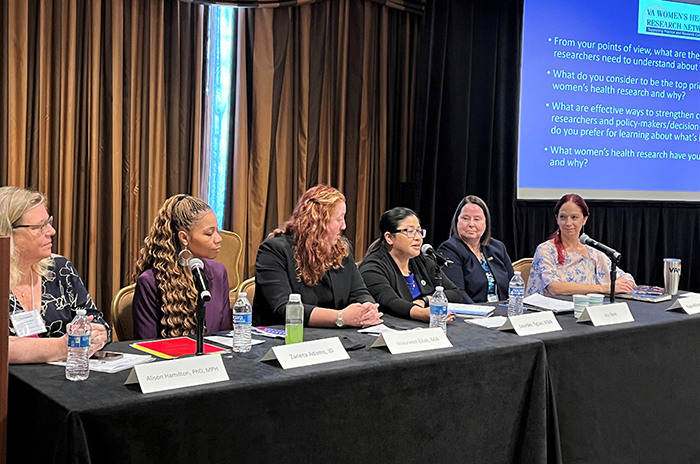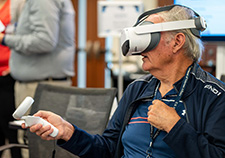Office of Research & Development |
 |


Research has shown that more than half of justice-involved Veterans have either mental health problems—namely PTSD, depression, or high anxiety—or substance-abuse disorders, most notably alcohol or cocaine addiction. (Photo: ©iStock/BrianAJackson)
September 7, 2018
By Mike Richman
VA Research Communications
The term justice-involved Veterans is used to describe former service members who have been detained by or are under the supervision of the criminal justice system. Their involvement can range from arrest, to court involvement, to incarceration in jail or prison.
More than half of justice-involved Veterans have either mental health problems—namely PTSD, depression, or high anxiety—or substance-abuse disorders, most notably alcohol or cocaine addiction. According to Dr. Andrea Finlay, a large percentage of these Veterans are also homeless or at-risk for homelessness, and many others face such challenges as finding work and reintegrating into society. Plus, Veterans who collide with the criminal justice system may be at higher risk for suicide.
"The Veterans who have shared their stories with me have helped shape my research."
Finlay is one of several VA researchers who are exploring trends and characteristics related to this population of Vets. She's a research health scientist in the Center for Innovation to Implementation at the VA Palo Alto Health Care System in California.
Finlay has been the principal investigator on three studies—how mental health and substance use disorders differ by gender among Veterans; Veteran use of VA mental health and substance use disorder treatment after exiting prison; and pharmaceutical treatments of opioid use disorder by Veterans who rely on VA hospitals. She's contributed to other research papers on Veterans and the criminal justice system.

Dr. Andrea Finlay, with the Center for Innovation to Implementation at the VA Palo Alto Health Care System, has been studying Veterans who've been involved with the criminal justice system. (Photo by Adan Pulido)
Her work has largely focused on examining Vets who access two VA programs that provide outreach to Veterans in criminal justice settings: the Health Care for Reentry Veterans Program, which assists Vets who are in state or federal prison; and the Veterans Justice Outreach Program, which helps Veterans who are in courts and jails. Both programs try to connect justice-involved Veterans with medical, mental health, and substance use disorder treatment, as well as housing and other support programs.
"I am interested in working with and studying populations of Veterans who may need extra support or guidance to improve their health and lives," says Finlay, who also serves as a statistical consultant at Stanford University in California and is an affiliated researcher at the National Center on Homelessness Among Veterans.
"The most personally fulfilling part of my work is speaking with justice-involved Veterans and learning about their experiences and priorities," she says. "They have a unique perspective. The Veterans who have shared their stories with me have helped shape my research."

VA Researcher Named One of U.S.’ Top Female Scientists

2023 VA Women's Health Research Conference

Self-harm is underrecognized in Gulf War Veterans

Virtual reality technology helps Veterans in pain
Finlay also enjoys working with Veterans' justice program specialists at VA facilities. These specialists conduct outreach in court, jail, and prison settings, working with justice-involved Veterans to connect them with VA and community health care and services.
More than 35 specialists served on expert panels for her VA Health Services Research and Development Researcher in Residence grant, which focused on Veterans' justice initiatives in VA homeless programs. They provided insight and feedback that helped in analyzing the results of the project, she notes.
Finlay explains that VA services differ depending on where the Veteran is in the criminal justice system. Those who are in jail or prison can't receive VA medical services because they are under the care of another agency that's required to provide medical treatment. However, those same Veterans can receive VA outreach services. Veterans who are living in the community but are involved in the justice system only through police contact or courts can seek treatment at VA facilities, she says.
"Although I tend to examine Veterans in these programs together," she says, "Veterans coming out of prison tend to have different needs than those who are coming out of jail. For instance, Veterans coming out of prison are older and generally have fewer ties to the community after extensive prison sentences. They also have fewer mental health and substance use disorder conditions than Veterans coming out of jail."
In general, Veterans in jail may have been arrested and are awaiting their initial hearing, or they have been convicted and are serving a sentence, which is usually less than a year for such crimes as misdemeanors. Vets in prison are serving sentences usually of a year or more and have committed more serious felony crimes.
VA doesn't maintain detailed information on the crimes that Veterans commit the most. But a 2015 U.S. Justice Department report indicated that most of the Veterans in prison had committed violent sexual offenses (35 percent) and other violent crimes (29 percent), followed by drug crimes (14 percent) and property crimes (12 percent). Most of the former service members in jail had committed property crimes (21 percent), drug crimes (18 percent), violent offenses (16 percent), violent sexual offenses (12 percent), and other crimes (26 percent).
The same report noted that two-thirds of the Veterans in prison and jail were discharged from the military between 1974 and 2000. But those findings, Finlay says, do not necessarily reflect a lack of justice involvement by post-9-11 era Veterans. About 9 percent of Veterans and service members who have served in Iraq and Afghanistan have been arrested since returning home.
"I think those numbers [from 1974 to 2000] have more to do with how the criminal justice system has been structured, than with differences in military service," she says. "We know that Veterans from the draft era of service were less likely to be incarcerated for all types of crimes than Veterans from the all-volunteer force era. For some Veterans, their involvement in the justice system may start with less serious crimes that do not result in incarceration. But their justice system involvement may escalate over time. For Veterans from earlier eras, they have had more time to be involved in the justice system."
Many of the service members and Veterans who were deployed to Iraq and Afghanistan are returning with serious physical or mental health problems. A large percentage of them are battling traumatic brain injuries, PTSD, depression, or musculoskeletal ailments. They may resort to alcohol or hard drugs to cope with their pain.
All of these circumstances could lead to run-ins with the law.
Whether the focus is on post-9-11 Vets or those from other eras, Finlay thinks VA is devoting a good share of attention to the issue of justice-involved Veterans. She also believes there's been a lot of concern outside of VA, as evidenced by the rapid expansion of Veterans treatment courts. The number has risen from 25 in 2009 to 461 in 2016.
"Because of the overlap between justice-involvement, suicide, homelessness, PTSD, and traumatic brain injury, I think justice-involved Veterans may continue to receive attention," Finlay says. "This issue isn't going away."
Less than a decade ago, Allicia Arredondo was a poster child for drug addiction. She says she injected herself with heroin "around the clock" to get high. There was no sobriety period unless she couldn't get her hands on the narcotic, which produces a euphoric feeling. She even thought her three kids were "getting in the way of me feeding my addiction." Her father eventually took over caring for them.
"I became that person that I didn't even recognize," says Arredondo, who served in the Army from 1990 to 1997. "I wasn't myself. Heroin consumed me. My whole existence the entire day was getting and finding ways to do drugs.
"I was stealing. I was trading things that I would steal for drugs. And I tried to put myself around people that had drugs all the time. That was the only way to survive. If I wasn't able to get high, I was going to get terribly sick. At that point, I knew I was either going to die trying to get off of the heroin, or I was going to die from doing it. I kind of felt that death was the only way I could save myself. It was that bad."
But somehow, someway, Arredondo escaped the depths of despair. Humbled by a run-in with the law and its consequences, she re-focused her outlook on life and climbed up the professional ladder to become a full-time administrative assistant in mental health services at the Boise VA Medical Center in Idaho. That department evaluates and treats Veterans for a range of health conditions, including addictive behaviors.
How did she come full circle?
After being charged in 2011 with grand theft and forgery for stealing her father's check and cashing it into her bank account, she was sentenced in 2013 to serve time in Veterans treatment court. Veterans treatment courts serve only Vets who are charged with non-violent crimes and are in need of mental health or substance abuse treatment. Those sentenced must make regular court appearances, attend all substance treatment sessions, and undergo frequent and random testing for drugs and alcohol, before they are eligible for release.
This was the turning point for her.
"I knew this was my only hope," she says. "I wanted to get sober, but I didn't know how. I couldn't do it. I had lost the ability to live and function normally in a community. I couldn't pay a bill. I wasn't even responsible enough to wake myself up and get anywhere on my own. It was an absolute nightmare, and I knew that the opportunity to get into Veterans treatment court was going to be my saving grace because in every court appearance I had to make, I didn't know if it was going to be my last one because of the uncertainty of whether I'd live to my next court date."
Arredondo found the process in Veterans treatment court to be "terribly difficult." But she felt that for the first time in her life, she was rewarded for working really hard at something. "The harder I worked, the greater payoff I was going to get," she says.
She lived at a women and children's shelter while serving her time, before moving to a safe and sober house.
"At the women and children's shelter, they woke me up in the morning and fed me," she says. "Those were things I couldn't do on my own. I didn't know how to apply for a job. I didn't know how to do anything. The only thing I knew how to do was drugs. So I started the process of going to group sessions. It was a hard thing to do when for the last 10 years all I was doing was focusing on feeding my addiction. I got a counselor in Veteran's court and started taking part in cognitive self-change classes, moral recognition therapy, and a women's process group. I also went to meetings held by a local chapter of [the drug rehab organization] Narcotics Anonymous."
She adds: "Basically, I was starting with absolutely no knowledge on how to live and be sober, and Veterans court was trying to rebuild me in a way. It was so hard, transitioning from lying and stealing all of the time to trying to obey the law. I had to start being honest. It got to the point where every aspect of my life revolved around recovery."
At the same time, Arredondo was required to go to the Boise VA for outpatient therapy related to her recovery from heroin addiction.
"My counselor at Veterans treatment court told me I had to go to outpatient treatment at VA," she says. "I had to see a counselor at VA. If I didn't do those things, I was going to go to jail. I didn't want to. It kind of started out as a fear-based thing and moved into more of a rehab process."
In 2013, shortly after starting Veterans treatment court, she began working at the Boise VA in the optical lab under a compensated work therapy program. She was released from Veterans treatment court in 2016 and got her own apartment. The day she moved in, her three kids came back to live with her. That same year, she was hired at the Boise VA as a housekeeper, and a few months later she landed a job in the mental health unit.
Meanwhile, Arredondo took the necessary training to become certified as a peer support specialist by the state of Idaho. She now mentors three women who are in Veterans treatment court. They are all recovering drug addicts who were charged with felony possession of a controlled substance (methamphetamines). She's also a peer support specialist at a safe and sober house that isn't specific to Veterans.
She urges her mentees to never give up in their quest to conquer their drug addiction. She also tells them recovery is possible if you do what the court officials tell you to do.
"When you're in Veterans treatment court, it feels like the worst thing in the world," she says. "You have somebody telling you what to do every single second. You don't want to do it because that's just in our nature as addicts. We always want to break the rules. We always feel the need to lie. We always think we know all of the answers."
She would also advise Veterans whose lives are spiraling out of control because of drug addiction—like hers once was—to go to a VA hospital for support.
"I was seeing a therapist on a regular basis at VA," she says. "I got involved with everything. I surrounded myself with people who were in recovery, who knew how to overcome their addiction, and who could teach me how to do the same. Now, I work in behavioral health at a VA hospital, so I get to support all of the programs that saved my life. I am forever grateful for that."
--- Mike Richman
VA Research Currents archives || Sign up for VA Research updates